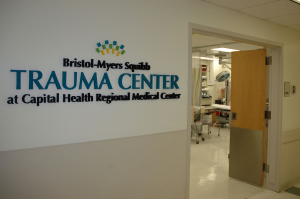The Bristol Myers Squibb Trauma Center at Capital Health Regional Medical Center is a Level II New Jersey state-designated Trauma Center. One of only 10 designated trauma centers in New Jersey, we are the regional referral center for injured patients in Mercer County and adjacent parts of Somerset, Hunterdon, Burlington, and Middlesex counties as well as nearby areas of Pennsylvania. We provide comprehensive care from the time of injury through rehabilitation.
Our Level II trauma center was built based on high national standards for patient care best practices. The designation process involves detailed regular inspections by national and state organizations to assure high standards of care. Our Trauma Center cares for severely injured patients as well as victims of accident types known to be associated with a high risk for injury. Trauma patients include persons involved in motor vehicle crashes, falls, and assaults with knives, guns, or blunt objects.
Severely injured patients are brought to us by ambulance or helicopter, where our Trauma Center has the latest technology and experienced trauma staff ready to care for you or your loved one. In addition to providing care to the injured, our Trauma Center also actively partners with local schools and community organizations to offer injury prevention programs and education.
What is the difference between a trauma center and a general hospital?
You may wonder why your family member was transported here when there was a hospital closer to your home. Our Level II Trauma Center differs from general hospitals by providing an aggressive team approach to injured patients, resulting in the shortest possible time from injury to treatment when every minute counts. Our trauma care includes 24-hour immediate access to trauma surgeons and other specialists, physician assistants, operating rooms, blood bank, radiology, and dialysis. Many of these specialists are not available in general hospitals. This around-the-clock immediate response is largely responsible for the 20 to 40 percent increase in survival seen in trauma centers.
